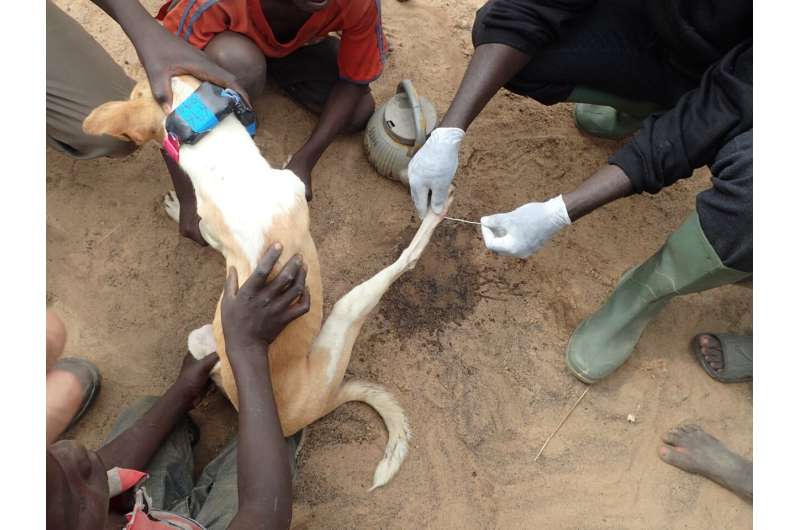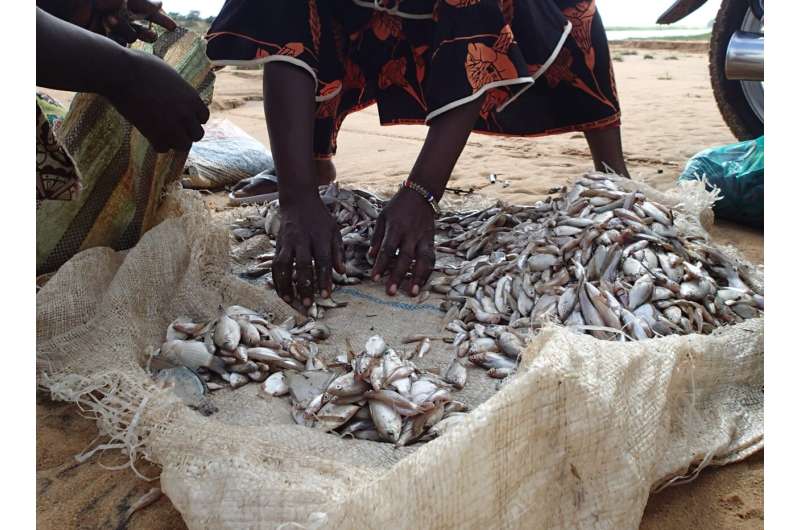A Guinea worm emerging from a dog's leg. Credit: Jared Wilson-Aggarwal
Efforts to eradicate a human parasitic disease are being hampered by dogs eating infected fish, new research shows.
Guinea worm disease is usually caught by drinking water containing water fleas that carry the parasite larvae.
The worms mate and grow inside the body, and after 10-14 months the one-meter-long adult worm emerges, usually from the arms or legs, to shed its larvae back into water.
The parasite causes disability and trauma in some of the world's poorest communities in Chad, Ethiopia, Mali and South Sudan.
Eradication programs have cut human cases of Guinea worm from millions a year in the 1980s to just 27 in 2020.
Guinea worm would be only the second human disease to be eradicated, after smallpox.
Just as eradication looked imminent, it has emerged that domestic dogs are also harboring the parasite.
Targeted surveillance showed that in 2020, 93% of Guinea worms detected worldwide were in dogs in Chad, in central Africa.
Research by the University of Exeter, published today in Current Biology, has revealed a new pathway for transmission—by dogs eating fish that carry the parasite larvae. This means dogs maintain the parasite's life-cycle and humans can still catch the disease.
The researchers worked in villages along the River Chari in Chad. Credit: Jared Wilson-Aggarwal
The researchers worked for a year in several of the worst-affected villages along the River Chari in Chad.
They tracked hundreds of dogs with satellite tags to analyze movements, and revealed dog diets throughout the year using forensic stable isotope analysis of dog whiskers.
Much of the fish eaten by the dogs—usually guts or smaller fish—was discarded by humans fishing on the river and its lagoons.
Professor Robbie McDonald, of Exeter's Environment and Sustainability Institute, who led the study said: "Dogs are now the key impediment to eradicating this dreadful human disease.
"Our work shows that fisheries, and the facilitation of dogs eating fish, are likely contributing to the persistence of Guinea worm in Chad.
"The challenge now is that this pathogen must be eliminated not only from people but also from animals.
"This is a clear example of where a 'One Health' approach to integrating health of people, animals and the environment is required to eradicate this debilitating human disease."
The work was sponsored by The Carter Center, founded by former US President Jimmy Carter, and work in Chad was supported by WHO and the Chad Ministry of Public Health.
The paper is entitled: "Seasonal fishery facilitates a novel transmission pathway in an emerging animal reservoir of Guinea worm."
More information: Robbie A.McDonald, Seasonal fishery facilitates a novel transmission pathway in an emerging animal reservoir of Guinea worm, Current Biology (2021). DOI: 10.1016/j.cub.2021.11.050. www.cell.com/current-biology/f … 0960-9822(21)01609-2
Journal information: Current Biology
Provided by University of Exeter





















